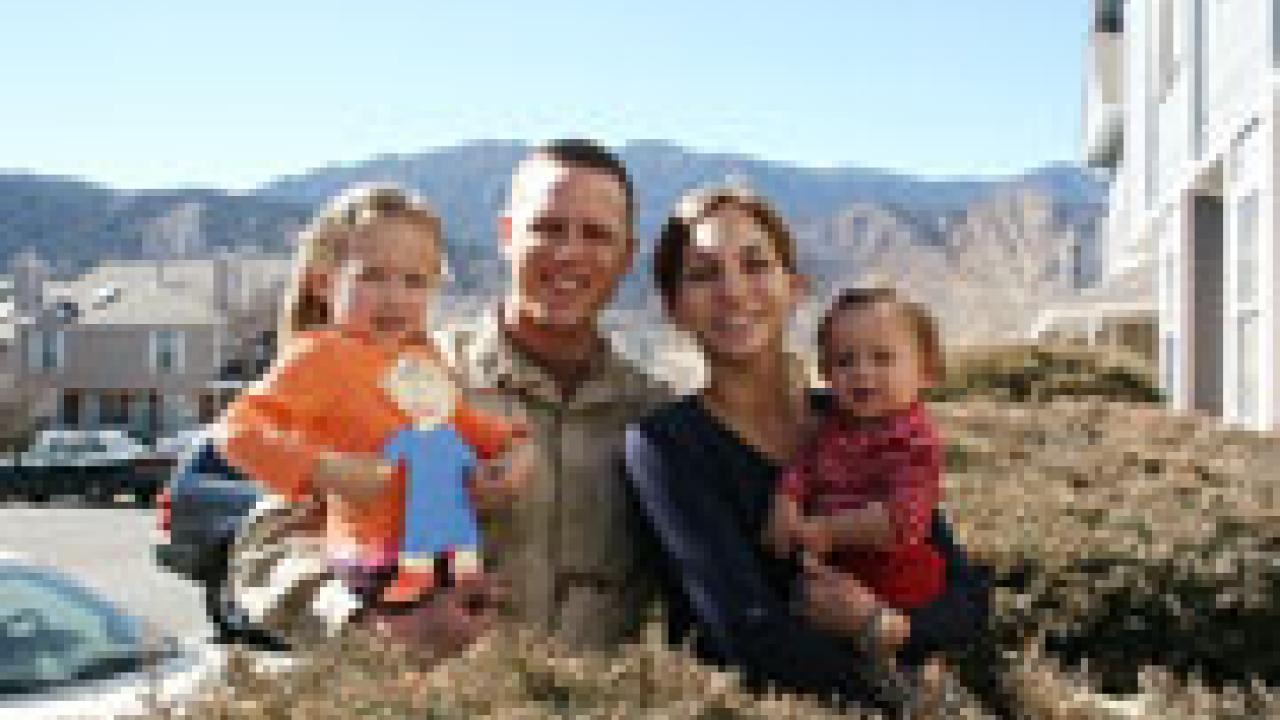Why is this soldier smiling?
Because after two years and 1,100 combat hours flying helicopters in Iraq, U.S. Army Capt. Stephen Heringer IV is back in the states with the prospect of spending more than merely a few months with his family.
Until the time the adjacent photo was taken, in March, Heringer had spent barely two of his seven years of marriage under the same roof with his wife, Sarah. His older daughter, Grace, was 3 years old but her father had been home for a total of just 10 months. Baby Ella, who was 1, had spent only six weeks with him.
Now, fast forward to last Monday (Nov. 6) at UC Davis, where Heringer was still smiling as he settled into his new posts as an ROTC instructor and home-every-night husband and father.
At age 30, Heringer has returned to his alma mater, where he graduated in 1998 with a bachelor's degree in civil engineering and a second lieutenant's commission in the United States Army. These days, as an assistant professor of military science, he drills ROTC cadets on the same grassy field by Hickey Gym where he himself drilled as an ROTC cadet (as well as a middle linebacker for the Aggies football team).
Dateline talked with Heringer at the A Street Field at 0630 hours — starting time for PHE 001-202, Military Conditioning-Advanced. The students are a mix of ROTC and non-ROTC. It probably is the only UC Davis course the civilian students will have that begins at sunrise, with Reveille played on a boom box while most of their classmates salute the American flag, and ends with a five-mile run.
Q: It's early. You do this every day?
A: No, just Monday, Wednesday and Friday. It's one of the joys of the Army. I don't like getting up at 6 a.m., but this keeps me in shape.
Q: You grew up on your family farm — fourth generation — in Clarksburg (a farming town south of Sacramento). Were your parents in the military?
A: My dad was drafted into the Army and served in Vietnam. My grandfather was an officer in the Army in World War II and was a UC Davis alum, too.
Q: When did you know you would join the Army?
A: Throughout high school, I always wanted to get involved with something that was bigger than myself — to make a contribution to the country. Growing up, I was very fortunate, very blessed in my community, my family. I wanted to give a little of that back.
Q: And how did you know you wanted to fly?
A: I was in elementary school and a child fell on the playground and had a pretty serious injury. Life Flight (the regional medical helicopter) came in and landed right on our soccer field and flew him out. That event had a lasting impact on me. I wanted to do something like that.
Q: Your ROTC service and pilot training occurred before 9-11. Had you really expected to go to war?
A: Yes and no. The first World Trade Center bombing had occurred. The military was serving in Bosnia and Kosovo. In the Army, the probability is you're going to deploy at some point. You enter with a deep desire to serve the nation and pay a little bit back for what it's provided for us. My service in Iraq only strengthened that desire.
Q: You were deployed in Iraq for much of your daughters' lives.
A: Yes, I missed both my daughters' first years. But watching children grow up in Iraq, I saw that our presence provided the smallest glimmer of opportunity (what children have in America) for those children. That really played heavily on my conscience and provided the motivation and strength I needed in being separated from my own family.
A: Would you change anything if you could?
Q: Not really. I don't regret my time over there. We're doing amazing things in Iraq for their future and their future generations. For example, because of the coalition forces, there's a generation of 3-year-old girls (like Grace) over there who have the chance to go to school now that they would not have had under Saddam Hussein's dictatorship.
A: Tomorrow we have a big election that is to some degree a referendum on the war. Saturday is Veterans Day. And you are a poster child for the American soldier.
Q: Yes, and I am training tomorrow's generation of leaders. One thing my experience over in Iraq showed me is that as a 22-year-old lieutenant you may be placed in charge of a small town. With little oversight you are expected to act as the mayor, town sheriff, city manager for all civil services, and mediator of civil disputes. It is a huge responsibility and we need to work hard to prepare our young men and women for that.
A: What are you going to do on Veterans Day?
Q: I am going to spend it with my family. We are celebrating my grandfather's 88th birthday.
